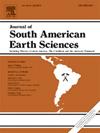巴西赤道大西洋圣佩德罗和圣保罗群岛(SPSPA)的磷化现象:鸟粪沥滤和化学风化的启示
IF 1.7
4区 地球科学
Q3 GEOSCIENCES, MULTIDISCIPLINARY
引用次数: 0
摘要
本研究通过分析鸟粪涂层与底层岩石之间的地球化学相互作用,探索赤道大西洋圣佩德罗和圣保罗群岛(SPSPA)的磷化过程。这项研究还考察了底层岩石的地球化学特征,评估了主要元素、次要元素、微量元素和稀土元素的行为,并确定了鸟粪壳、岩浆岩、橄榄岩和碳酸盐沉积岩受雨、风和半溶解等环境因素影响的风化退化程度。研究了化学元素在水溶相、吸附相、酸萃取/交换相、易酸易还原相、酸氧化相和残留相中的分布情况。该方法的主要研究结果表明,水溶性馏分中的 Na 含量升高,从而突显了受海水影响的快速、活跃的地球化学循环。相比之下,在酸性较强的环境中(pH 值接近 4.8 至 2.0),大量的大元素(如磷、铁、镁、铝和锰)与残留物相伴生,这表明在群岛这些营养物质的输入和输出系统中,成熟鸟粪的地球化学循环速度较慢,且呈递增趋势。矿物学方面,橄榄石、辉石和铬尖晶石等黑云母矿物以及氟磷灰石、柯林斯石和榍石等磷酸盐的存在也支持这一结论。这些发现强调了生物活动与地球化学过程之间复杂的相互作用,这些过程影响了深海磷酸盐岩富含磷酸盐的岩石中元素的动态变化。这项研究不仅加深了我们对磷化过程的了解,还为环境敏感区域海洋资源的可持续管理提供了重要启示。这项研究强调了在研究地球化学循环时考虑生物和环境变量的必要性,特别是在表现出独特的地质和生物相互作用的区域,这些相互作用对现行模式提出了挑战,例如在南太平洋和太平洋地区确定的模式。本文章由计算机程序翻译,如有差异,请以英文原文为准。
Phosphatization in the São Pedro and São Paulo Archipelago (SPSPA), Equatorial Atlantic, Brazil: Insights from guano leaching and chemical weathering
This research explores the phosphatization process in the São Pedro and São Paulo Archipelago (SPSPA), located in the Equatorial Atlantic, by analyzing the geochemical interactions between guano coatings and the underlying rocks. The study also examines the geochemical characteristics of the substrates, assessing the behavior of major, minor, trace, and rare earth elements, and determines the degree of weathering degradation of guano crusts, speleothems, peridotites and carbonate sedimentary rocks affected by environmental factors as rain, wind and halmyrolysis. The distribution of chemical elements in water-soluble, adsorbed, acid-extractable/exchangeable, readily acid and reducible, acid oxidizable, and residual phases were investigated. The principal findings of this method show that elevated Na levels are leached in water-soluble fractions, thereby highlighting the occurrence of rapid and active geochemical cycling, which is influenced by seawater. In contrast, in more acidic environments (pH close 4.8 to 2.0), considerable amounts of macroelements like P, Fe, Mg, Al, and Mn are found in association with remaining phases, indicating a slower and more incremental geochemical cycle of mature guano in the input and output systems of these nutrients in the archipelago. The mineralogy, as indicated by the presence of mafic minerals such as olivine, augite, and Cr-spinel, as well as phosphates including fluorapatite, collinsite, and spheniscidite, also supports this finding. The findings underscore the complex interplay between biological activities and geochemical processes, which influence the elemental dynamics in the phosphate-rich rocks of the SPSPA at depth. This study not only enhances our understanding of phosphatization processes but also offers important insights into the sustainable management of marine resources in environmentally sensitive areas. The research underscores the necessity of considering biological and environmental variables when examining geochemical cycles, particularly in regions exhibiting distinctive geological and biological interactions that challenge the prevailing models, such as those identified in the ASPSP.
求助全文
通过发布文献求助,成功后即可免费获取论文全文。
去求助
来源期刊

Journal of South American Earth Sciences
地学-地球科学综合
CiteScore
3.70
自引率
22.20%
发文量
364
审稿时长
6-12 weeks
期刊介绍:
Papers must have a regional appeal and should present work of more than local significance. Research papers dealing with the regional geology of South American cratons and mobile belts, within the following research fields:
-Economic geology, metallogenesis and hydrocarbon genesis and reservoirs.
-Geophysics, geochemistry, volcanology, igneous and metamorphic petrology.
-Tectonics, neo- and seismotectonics and geodynamic modeling.
-Geomorphology, geological hazards, environmental geology, climate change in America and Antarctica, and soil research.
-Stratigraphy, sedimentology, structure and basin evolution.
-Paleontology, paleoecology, paleoclimatology and Quaternary geology.
New developments in already established regional projects and new initiatives dealing with the geology of the continent will be summarized and presented on a regular basis. Short notes, discussions, book reviews and conference and workshop reports will also be included when relevant.
 求助内容:
求助内容: 应助结果提醒方式:
应助结果提醒方式:


